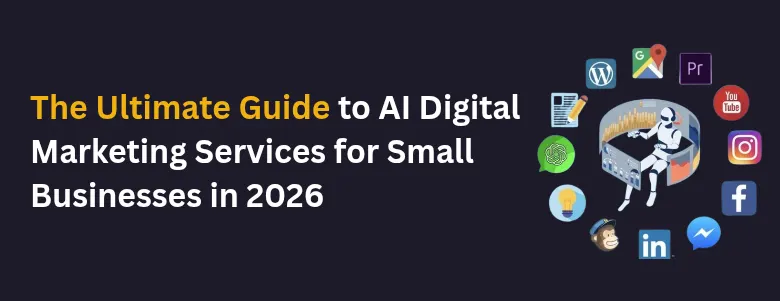Explore the top digital marketing trends of 2025 from AI and AR to emotional intelligence and ethics reshaping how brands connect, engage, and grow online.
Table of Contents
Introduction
Digital marketing will be completely different in 2025 than it was a few short years ago.With the advancement of AI, its capabilities skyrocketed. Although AR represents levels of consumer immersion that we have never before had access to, this is about the same time 75% of marketing is being performed by AI.
To remain relevant in today’s marketing, brands are introducing heavily ethical marketing, emotional intelligence, and a balance of automation and need for human creativity too. This blog constitutes the factors successful marketers should take into reflection as well as how AR and AI are clustering to change digital marketing.
To remain relevant in today’s marketing, brands are introducing heavily ethical marketing, emotional intelligence, and a balance of automation and need for human creativity too.
These shifts reflect major trends in digital marketing that are redefining the industry landscape.
Digital marketing will be completely different in 2025 than it was a few short years ago. This shift is driven by major digital marketing trends redefining how brands interact with consumers.
To better understand where the industry is heading, explore these Smart marketing strategies for small business for deeper insights.
2. The Rise of AI and the Future in Digital Marketing
AI in online marketing has advanced at a surprising rate. AI is being widely used across industries in today’s world due to cost savings and the need for effective workflows. Marketers can invest more time in strategy, creativity, and brand storytelling by tasking routine tasks to AI.
These innovations are shaping the core of digital marketing trends today.
2.1 How AI is Reshaping Customer Experiences
AI has changed customer interaction from being common to being highly modified. Predictive analytics, browsing history, and purchase history are now used by brands to instantly modify messages.
Important developments include:
- Adjusting customer journeys in real time
- Demand-based pricing and real-time consumer behavior
- Voice and visual search features that improve user comfort
Predictive analytics driven by AI helps brands increase conversion rates and encourage greater customer loyalty.
2.2 The Role of AI Agents in Marketing Automation
A principle shift has occurred with the change from simple AI tools to non-dependent AI agents. AI agents, as hostile to conventional assistants, actively participate in campaigns, carry out A/B testing, and individually optimize strategies.
AI agents have the following benefits:
- 75% time saved in preparing for the campaign.
- 50% time saved while creation of content
- Response times for customer service were cut by 80%.
Marketers can invest more time in strategy, creativity, and brand storytelling by tasking routine tasks to AI.
3. Emotional Intelligence: The New Frontier
With the advancement of automation, brands must take advantage of emotional intelligence to distinguish themselves and build lasting connections with consumers.
3.1 Why Emotional Marketing Matters
Emotions motivate about 95% of the purchases. Among the most impactful trends in digital marketing is the shift toward emotionally resonant brand communication. Showing emotional bonds with consumers benefits brands in the following ways:
- Double lifetime value compared to just “satisfied” customers
- 82% of emotionally connected customers remain customers.
- 306% increase in customer lifetime value and brand awareness increases by 21%
Emotional marketing is now a business essential rather than a competitive opportunity.
As such, it has become one of the most powerful digital marketing trends heading into 2025.
3.2 How AI Understands Human Emotions
Affective computing, also known as emotional AI, keeps an eye on emotions in real time by studying behavioral data, text sentiment, voice tones, and facial expressions.
Important results of emotional AI
- 12% increase in the purchase intent.
- 21% increase in ad recall
- 7% higher engagement rates than those of standard campaigns.
Brands can give extremely successful, compassionate customer experiences while protecting user privacy by matching content to emotions.
4. Balancing Automation with Human Creativity
AI can revolutionise efficiency, but human creativity cannot be replaced.
4.1 Risks of Over-Automation
Over-automation can lead to distant interactions, reducing customer trust and modification. It may also suppress creativity and hinder the ability to adapt to changing customer needs. Additionally, automated systems often struggle with complex obstacles and can compromise data security, leading to privacy risks. Finding the right balance is key to maintaining genuine, engaging customer experiences.
Brand experiences run the risk of becoming less customised if automation is used overly. Studies show:
- According to 77% of marketers, automation creates robotic, generic content.
- AI-generated ones were judged to be 23% less knowledgeable when compared to human-written whitepapers
Lack of human touch can damage brand loyalty and trust by automated content.
Finding the right balance is key to maintaining genuine, engaging customer experiences. This balance is also a focal point of evolving digital marketing trends.
If you’re looking to grow your brand online, our expert social media marketing services can help you build meaningful engagement, boost visibility, and drive results across platforms.
4.2 Preserving Authenticity in the AI Era
To be honest,
- Be honest and open about how AI is used.
- Ensure AI content is aligned with the brand’s voice.
- Consider AI to be a less experienced coworker that needs human oversight.
Brands with human supervision and exposure of AI use are more trusted and provide higher-quality content.
4.3 Human-AI Collaboration Success Stories
Successful partnerships include:
- Starbucks’ use AI to automate repetitive daily tasks so that staff employees can concentrate on interacting with customers.
- Human editorial content combined with AI recommendations used by Amazon
- Marketing teams are claiming that AI-human collaboration has saved time by 75%.
Successful brands combine human empathy, creativity, and judgment with AI’s efficiency.
5. The Rise of Augmented Reality (AR) in Digital Marketing
AR is revolutionizing how consumers connect with brands by offering engaging, interactive experiences that effortlessly blend the physical and digital worlds. This fusion allows users to engage with products in creative ways, enhancing brand visibility and creating deeper connections.
5.1 How AR is Transforming Customer Experience
Customers can use AR to:
- Before buying, test products remotely (e.g., AR changing rooms, test-before you buy makeup tests)
- Imagine the accent pieces or furnishings in their homes.
These include increased consumer satisfaction, increased experience, fewer product returns, and increased confidence when making a purchase. And also benefit the seller while saving on the resource.
5.2 AR Advertising: Future Opportunities
By 2025, augmented reality (AR) advertising will be a game changer rather than just a passing trend. Instead of relying only on still photos or traditional video ads, brands are now creating location-aware, engaging, and interactive experiences that captivate consumers in real-time. AR allows users to do more than just view products, connecting the gap between digital and physical environments.
The opportunities are:
- AR billboards that are interactive
- Virtual try on advertisements
- AR product demos at events and in-store
Customers get a firsthand look at brand stories in addition to trying on merchandise.
By 2025, augmented reality (AR) advertising will be a game changer rather than just a passing trend.
Among digital marketing trends, AR is rapidly gaining traction for its immersive capabilities.
6. AI + AR: The Next Frontier of Personalized Marketing
When AI and AR are combined, highly personalized marketing strategies are produced:
This powerful combination is at the forefront of emerging digital marketing trends.
- AI uses user data analysis to suggest selective AR experiences.
- AR environments change strongly in response to behavioral and emotional cues.
- Each user can have a personalised virtual tour thanks to predictive personalization.
When AI and AR are combined, marketing becomes an experiential, playful, interactive, relationship-building activity rather than a transactional one.
7. Ethical and Privacy-First Marketing
Today’s consumers demand greater transparency and ethical practices from brands than ever before.
7.1 Importance of Ethical Marketing
According to research,
- 94% of customers stick with brands which transact transparency.
- 56% commit to support ethically conscious companies for the rest of their lives.
In addition to data privacy, ethical advertising includes fair AI practices, digital carbon footprints, and sustainable sourcing and keeping the eco-friendly use of technology.
7.2 Privacy-First Personalization Strategies
The following are important tactics:
- Giving first-party data collection priority over third-party cookies
- Applying privacy-preserving technologies such as federated learning and differential privacy
- Making use of open value transactions that clearly benefit users
Long-term loyalty and trust are gained by brands that treat customers with respect and provide personalized experiences.
8. Conclusion
2025, digital marketing will need a mix of human creativity, emotional understanding, ethical responsibility, and new technologies like AI and AR.
Navigating future digital marketing trends will require this well-rounded approach.
Leading brands will not only focus on automation but also foster emotional connections with their customers, resulting in significant, reliable, and impactful experiences. True success is achieved when there is a harmonious balance between technology and human touch; as AI excels in processing scale and data, humans aim to cultivate empathy, ethics, and creativity.
Keeping pace with evolving trends in digital marketing is essential for brands aiming to remain innovative and customer-centric.
Individuals who integrate these elements in an ethical and harmonious manner will emerge as the marketers of the future.
If you’re ready to elevate your marketing strategy, Contact Us today—we’d love to help you grow.
9.FAQs
What are the top digital marketing trends for 2025??
AI-driven personalization, voice/visual search, AR experiences, smart AI agents, emotion-aware marketing, privacy-first strategies, interactive content, and ethical branding.
Is digital marketing worth it in 2025?
With AI, AR, and data-driven personalization shaping customer behavior, businesses leveraging digital marketing gain a competitive edge in reaching, engaging, and converting their target audience effectively and efficiently.
What is AI in digital marketing 2025?
AI in Digital Marketing 2025 refers to the use of advanced artificial intelligence tools to automate, personalize, and optimize marketing efforts—enabling real-time customer insights, emotion detection, content creation, chatbots, and predictive analytics for better results and user experiences.
Author
-
I’m Priyanshu Maurya — a passionate content creator who thrives on transforming ideas into powerful, relatable narratives. I believe in the art of simplifying complexity and making every piece of content meaningful and impactful. Whether I’m writing about technology, digital trends, or everyday insights, I aim to inform, inspire, and connect with readers on a deeper level. For me, writing isn’t just a skill — it’s my way of making a lasting impression in an ever-evolving digital world.





